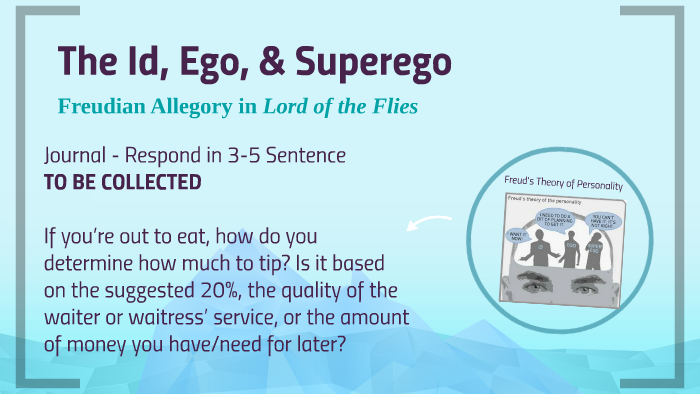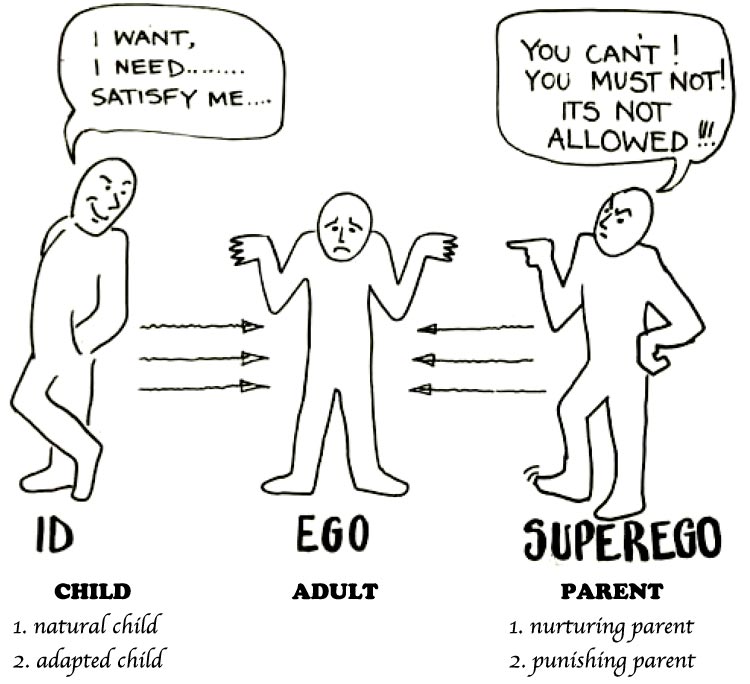

“ This is the darkest part, the most impenetrable of our personality. The first theory was divided into three parts (conscious, preconscious, unconscious), but Freud quickly realized the limitations of this theory.įreudtherefore creates a second theory (in 1923) built on this triptych, ego, superego and id: Freud and the id: 5 In summary: The second topic at the heart of the human personnalityįreud and the second topic : Ego, Supergo and Idįreud has brought a quite simple revolution: it consists in destroying, disintegrating the human subject, such as Descartes and Kant had defined him, that is to say as being endowed with a faculty of representation, namely consciousness.1 Freud and the second topic : Ego, Supergo and Id.Further, the levels of guilt in the two cases above will be high and low, respectively. According to Freud, a strong super-ego serves to inhibit the biological instincts of the id, while a weak super-ego gives in to the id's urgings. Both parts of the super-ego develop through experience with others or via social interactions. Comparisons are made between the ego-ideal and one's actual behavior. The ego-ideal is an idealized view of one's self. The conscience decides what course of action one should take. The conscience is the familiar metaphor of angel and devil on each shoulder.


The superego consists of two parts, the conscience and the ego-ideal. For example: having extra-marital affairs". "The Super-ego can be thought of as a type of conscience that punishes misbehavior with feelings of guilt. It comprises that part of the personality, mainly unconscious, which includes the individual's ego ideals, spiritual goals, and the psychic agency (commonly called "conscience") that criticises and prohibits his or her drives, fantasies, feelings, and actions. The Super-ego aims for perfection and the ideal outcome. bringing about harmony among the forces and influences working in and upon it, and readily 'breaks out in anxiety". "Thus the ego, driven by the id, confined by the super-ego, repulsed by reality, struggles. 110 Its task is to find a balance between primitive drives and reality while satisfying the id and super-ego. 363/4īut the ego "serves three severe masters.the external world, the super-ego and the id". in its relation to the id it is like a man on horseback, who has to hold in check the superior strength of the horse with this difference, that the rider tries to do so with his own strength, while the ego uses borrowed forces". The ego represents what may be called reason and common sense, in contrast to the id, which contains the passions. "The ego is that part of the id which has been modified by the direct influence of the external world. It helps us to organise our thoughts and make sense of them and the world around us. Ĭonscious awareness resides in the ego, although not all of the operations of the ego are conscious. It seeks to turn the id’s drive to behaviour which brings benefits in the long term rather than grief. The ego is governed by the 'reality principle', or a practical approach to the world. The ego is the sense of self and the surface of the personality, the part you usually show the world. It is filled with energy reaching it from the instincts, but it has no organisation, produces no collective will, but only a striving to bring about the satisfaction of the instinctual needs subject to the observance of the pleasure principle". "It is the dark, inaccessible part of our personality. By adding thanatos, he could describe more mental phenomena. Obviously, the rest of the personality would have somehow to deal with these two instincts. Thanatos accounts for the instinctual violent urges of humankind. So, he proposed thanatos, the death instinct. After the tragedy of World War I, however, Freud felt it necessary to add another instinct to the id.

The id is governed by the 'pleasure principle'.Įarly in the development of his theory Freud saw sexual energy as the only source of energy for the id. The id represents a constant in the personality as it is always present.


 0 kommentar(er)
0 kommentar(er)
